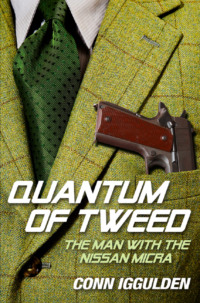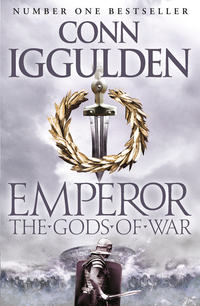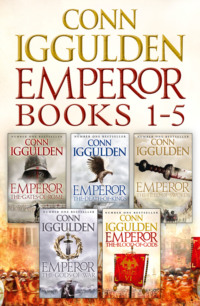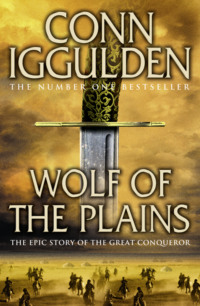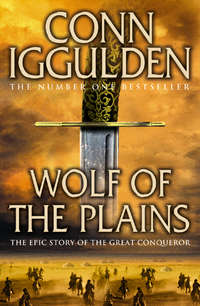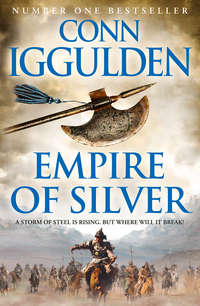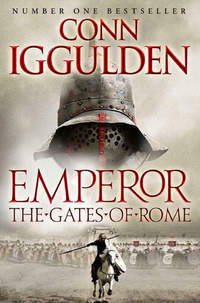
Полная версия
Conqueror
‘Bring enough for a few days and I will leave you,’ he said.
He reached into the purse and withdrew two silver coins. Both men lowered their bows and one came forward to take the coins while the other watched closely, still suspicious.
Kublai took his feet out of the stirrups as he sat and reached down with the coins. He had half expected it, but it was still a shock when the man grabbed at his long sleeve and tried to pull him out of the saddle. He kicked out sharply, catching the man under the jaw with his boot and sending him reeling, his mouth suddenly bloody from a bitten tongue. The other one gaped and raised his bow, but Kublai kicked his mount forward, drawing the sword and lowering the tip to the man’s throat.
At that moment, Kublai heard a new voice, snapping a question. He dared to glance up from the terrified man he held at sword-point and his heart sank. Two of Guyuk’s scouts had approached the small collection of houses from the other side, walking their horses in while he had been distracted.
Kublai sheathed the sword and dismounted immediately on the far side of his mount, his mind racing. He could not outrun such men. They were more used to long distances than he could ever be and they would run him down before the day was over. He cursed himself for his mistake, then put it aside, finding a perfect calm he had learned at the feet of the khan’s chancellor years before. There was no profit in panic and he made quick decisions as he stood and waited for them to come closer.
The scouts were wary, but they saw only three men in a scuffle, one with blood leaking from his mouth. They trotted their mounts closer and Kublai dropped his shoulders lightly, disguising his height with a stoop as he fussed at his horse. He was as filthy as the other two, his robe as ragged as theirs. Only his sword marked him out and he hoped the scouts would not look too closely at it. The two thieves bowed deeply to the khan’s scouts and he copied them, his manner awed at meeting such important men.
‘Stand still,’ one of the scouts said sharply.
His companion stayed back a few paces, but the first one came among them. Kublai guessed he was the senior of the two, long used to the authority of being the khan’s man.
‘What’s this then?’ the scout asked. He was older than Kublai would have expected, but whip-thin despite his age.
Kublai spoke quickly. ‘Just a disagreement, lord,’ he said, dipping his head. ‘A discussion over some goats I was buying.’
Out of the corner of his eye he saw the injured herder gape at him. A scout might be tempted to make an example of a thief on the road, even to take them all to the khan for justice. He would have no interest in settling some local dispute. Kublai only hoped the men would keep their mouths shut and let him talk his way out of it.
‘I clip the left ears of my animals, two clips, as you can see there,’ Kublai went on, pointing. The scout didn’t look round, too old a hand to be distracted. ‘My cousins do the same, which I have told them would lead to … um … disagreements like this one, lord. The animals are mine, I’d know them anywhere. You are a khan’s man, lord. If you could rule on this, I’d be grateful.’ He rambled on and the scout relaxed, turning to grin at his companion.
The herder with the bloody mouth tried to speak and Kublai whirled on him.
‘Shut your mouth, Hakhan, this is all your doing. I know that brown one like it was my own child.’
Both herders stared in amazement at the madman who addressed them in such a way, but the scouts were already losing interest. He kept his gaze down and spoke on, playing the role with everything he had.
‘My lord, if you could just stay while I gather up the ones that are mine, I will send a hundred prayers to the sky father for you. My wife is pregnant again. We don’t have much and I can’t afford to lose some of my best breeders now.’
‘Come on,’ the older scout said to his companion. He had lost interest in the three grubby men who stood and argued in the road. Kublai kept pleading with them as they turned to ride away, but relief washed over him. At last, he was alone once again with the two herders. Both stared at him as they might have at a mad dog. The one with the bloody mouth spat red onto the ground and spoke, though the effort cost him dearly.
‘Who are you?’ he managed.
‘Just a traveller,’ Kublai replied. His muscles had been tensed to attack for too long and his hands shook as he unclenched. ‘In need of food and water, as I said. Now, if you still have an idea of robbing me, I will not be merciful the second time. One shout will bring them back.’
The herders looked instinctively to where the scouts had ridden away and both of them seemed to dislike that thought. There was little justice on the plains. Even the distant presence of the khan’s men was enough to send terror into their hearts.
Rather than turn his back on the pair, Kublai mounted again and trotted the horse behind them as they filled his waterskin and gathered a small package of fresh-cooked lamb and stone-ground bread. It smelled delicious, but he would not break his fast until the khan’s army was far behind him. Batu’s land lay more than a thousand miles to the north, but it was not enough to reach him barely ahead of the khan’s armies. Kublai was grim as he set out again, alert for any sign of the scouts in the distance. To run, Batu would need all the time Kublai could give him.
CHAPTER SEVEN

Over three days of hard riding, Kublai ran his horse to complete exhaustion. The animal cropped grass in its sleep, but there was never enough time for it to recover before he had to mount again. He was in pain as he climbed into the saddle on the fourth day. He did not have the calluses of the scouts and great patches of skin had rubbed away on his buttocks and lower back. Each morning was an agony until the scabs broke and settled to a numb ache that would last all day. He did not know exactly how far he had come, only that the khan’s army were far behind him. Batu had kept an entire tuman of warriors and their families when he travelled to his new lands. They would have grown in number and so many could not be hidden easily. Kublai expected to find signs of them, though that was a challenge for another day.
His immediate problem was that his horse had lost weight alarmingly and was sweating and chewing yellow spit at its mouth. It was time to test the yam lines in a plan that had seemed simple back in Karakorum. From his saddlebags, Kublai drew out a set of small bells sewn into cloth. He draped them over his saddle and took his bearings once again, from the hills around him. There was no one in sight, but he had seen a yam station some twenty miles back and aligned himself to the path worn by its riders. He took stock of himself for the last time and winced at his own weariness. No yam rider rode with packs on his mount. Weight was everything. With a grimace, he wrenched the buckles open and let his supplies tumble out. His bow followed and he held his sword for a long moment before placing it on top of the small pile of leather and cloth. In hostile territory, he felt as helpless as a newborn child without it, but there was no alternative. He kept only a small leather bag he could strap to his back, exactly the sort of thing yam riders carried. He had even written an innocuous letter to a false name, ready to be shown if he were stopped and searched, though that was not likely. No one interfered with a yam rider.
On a whim, he sliced the bags into strips, then wrapped the scabbarded sword securely, making a package that he could hide. The blade was valuable and though he doubted he would ever see it again, he could not just leave it in the dust for scavengers or, worse, the khan’s scouts when they came riding behind him.
Kublai drew his horse into some trees and settled down to wait for dusk. There could only be a few miles to go and he wanted to arrive at the yam station at sunset, or even night. It had been Genghis himself who set the distance between yam stations at twenty-five miles. Some of them had been in operation for so long that wide roads stretched between them and families had built homes of brick and clay. He lay back against a tree trunk with the reins looped around his fist.
He awoke to find the trees were dark around him. He had no idea how much time had passed and cursed as he stood up and reached for his saddle. His horse whinnied, stepping away, so that he had to slap its face to get it to stand still.
In moments, he was back on the road, trotting and listening for signs of life. The moon had barely risen and he was thankful the night was still with him. It was not long before he saw lights ahead and forced his mount into a gallop once more. The bells on his saddle jingled at every step, loud in the darkness.
The yam station was a small one, built of flint and limestone in the wilderness, with little more than a few outbuildings and a cobbled yard. Torches had been lit as they heard him approach and Kublai rode in confidently, seeing two men waiting. One carried a fat waterskin and the other a platter of steaming meat scraps, still dripping water from the boil-pot inside. Another horse was already being led out of the stables, made ready as he dismounted.
‘Who are you?’ the man with the platter asked suddenly.
‘I’ve come from Karakorum, with urgent messages,’ Kublai snapped. ‘Who are you?’
‘Sorry,’ the man replied. He still looked suspicious and Kublai saw his gaze fall on the horse he had brought in. Kublai was not the first to think of stealing a yam pony in such a way, but the quality of the mounts they brought in usually gave thieves away. Kublai saw the man nod grudgingly to himself. Even so, he spoke again as Kublai took a double handful of moist lamb shreds and chewed them.
‘If you’re from Karakorum, you’ll know the yam master there.’
‘Teriden?’ Kublai said around his mouthful. ‘Big Christian with a red beard? I know him well.’
It was an easy test for a young man who’d grown up in the city, though his heart thumped in his chest at the thought of being found out. Trying to hide the stiffness of his saddle sores, he mounted the fresh horse, adjusting his small pack on his shoulders as he accepted the skin and knocked back a draught of airag mixed with water. It was cheap and sour, but it warmed him and he gasped as he tossed it back. From that point on, his only sustenance would come from yam stations.
‘I’ll tell him you keep a good house here,’ he said as he took up the reins and trotted the horse to the stone gate. The yam staff were already busy unsaddling his last horse and rubbing it down. The animal steamed in the torchlight and no one bothered to reply. Kublai smiled and dug in his heels, clattering out onto the road north. It had worked and it would work again. It had to if he were to stay ahead of the khan’s army. No message could move faster than those riders. Until he spoke to Batu himself, the man would be completely unaware of the threat against him.
As Kublai left, the yam servant stared thoughtfully after him. He’d never seen yellow eyes like those before. Genghis was said to have had such eyes. The man scratched a flea bite on his cheek, lost in thought. After a time, he shrugged and went back to work.
The four men had watched the trail for three days, hunting in pairs, so that there were always rabbits for the stew each night. There was a huge warren nearby and it was easy enough to set strangling snares over the holes. They had a good view of the road through the mountains and so they spent their time talking, or gambling with knucklebones, or just repairing old kit. They knew they could expect to be relieved in another two days and they were approaching the end of their time. There had been little excitement. Just one family of peddlers had passed through and the men were not interested in the cheap goods they had in their little cart, drawn by an ancient pony with one white eye. With rough laughter and a kick, they had sent them on their way.
‘Someone coming,’ said Parikh, the youngest of them.
The other three shuffled over to the edge of their small camp, looking down at the trail below while being careful not to show their heads. Their bows were well wrapped against damp, lying unsprung so the strings didn’t stretch. Nonetheless, each man had the weapons in easy reach. They could have an arrow ready to fly in moments. They peered down, cursing the morning haze that blurred the air, seeming to come from the rocks themselves before it burned off.
Despite the mist, they could see a single man walking slowly, leading a lame horse. His head was bowed and he looked like any poor warrior, stumbling home after many nights hunting, or searching for a lost animal. Even so, the watchers had been placed on that road as the first line of defence and they were wary of anyone. The oldest, Tarrial, had seen more than his share of ambushes and battles. He alone had scars on his forearms and they looked to him for decisions. Sound carried far in the mountains, and with a silent gesture Tarrial sent Parikh off on his own along the ridge. The lad would scout for anyone else creeping up on them, as well as providing a second shot from hiding if something went wrong. The others waited until Parikh reached a place where he could see half a mile along the back trail. The young man raised a flat palm to them, visible at a distance. Clear.
Tarrial relaxed.
‘Just one man. Stay here and don’t steal my food. I’ll go down to him.’
He made no attempt to hide his progress as he scrambled down the rocky scree. In fact, he made as much noise as possible, rather than make the stranger nervous. Years before, Tarrial had seen his jagun officer killed on patrol in Samarkand. The officer had kept to the shadows while thieves robbed a store. As one of them passed him, he had stepped out and laid a heavy hand on his shoulder, hoping to scare the thief half to death. His ploy had worked, but the man jammed a dagger into his ribs in panicked reflex. Tarrial smiled fondly at the memory of the officer’s face.
By the time he reached the trail, the stranger was close enough for Tarrial to make out his features. He was tall, unusually so. The stranger looked exhausted, his feet barely lifting with each stride. The pony was as dust-covered as he was and favoured its right foreleg.
Kublai sensed Tarrial’s gaze and jerked his head up. His hand dropped to his hip, but there was no sword there and, with a grimace, he raised his free hand to show he was unarmed.
‘Yam rider?’ Tarrial called.
‘Yes,’ Kublai replied. He was furious with himself for walking so blindly into the hills. He had lost track of the days, even of the horses he’d exchanged at yam stations along the way. Now, everything he had achieved could be undone by a few thieves. Not for the first time, he regretted leaving his weapons behind.
‘Who is the message for?’ Tarrial asked. There was something about the man that had his instincts twitching, though he couldn’t say what it was. Through all the grime that layered him, pale yellow eyes glared at Tarrial and more than once the rider’s hand dropped to his hip, as if he was used to carrying a sword. Odd, for a simple yam rider who always went unarmed.
‘No one stops the yam,’ Kublai said sternly. ‘The message isn’t for you, whoever you are.’
Tarrial grinned. The man couldn’t be much older than Parikh, but he spoke like one used to authority. Again, that was a strange thing for a yam rider. He couldn’t resist prodding a little further, just to get a reaction.
‘Seems to me a spy would say the same thing, though,’ Tarrial said.
Kublai raised his eyes to the sky for a moment. ‘A spy on a yam horse, with a leather bag? With nothing at all of value on him, I might add.’
‘Oh, we’re not thieves, lad. We’re soldiers. There’s a difference. Not always, I admit, but usually.’
To his surprise, Kublai straightened subtly, his gaze sharpening.
‘Who is your minghaan officer?’ he said curtly.
‘He’s about a hundred miles away, lad, so I don’t think I’ll be bothering him with you, not today.’
‘His name,’ Kublai snapped. There were only ten minghaans to every tuman. He knew the name of almost every man who held that rank in the nation.
Tarrial bristled at the tone, even as he wondered at it. Alone, unarmed, hundreds of miles from anywhere and the man still had an air about him that made Tarrial reconsider his first words.
‘You’re not like the yam riders I’ve seen before,’ he said warily.
‘I don’t have time for this,’ Kublai replied, losing patience. ‘Tell me his name, or get out of my way.’ Before Tarrial could reply, he tugged on his reins and began walking again, taking a path straight at the warrior.
Tarrial hesitated. He was tempted to knock the rider on his backside. No one would blame him, but some instinct for survival stayed his fists. Everything had been wrong about the meeting from the first words.
‘His name is Khuyildar,’ he said. If the rider tried to barge past him, Tarrial was confident he could put him down. Instead, the man stopped and closed his eyes for a moment, nodding.
‘Then the message is for his master, Batu of the Borjigin. For his ears alone and urgent. You had better take me to him.’
‘You only had to say, lad,’ Tarrial replied, still frowning.
‘Now.’
CHAPTER EIGHT

There wasn’t much conversation as Tarrial and Parikh led Kublai through the mountains. They had left only one man behind to watch the road, while the last of the four rode back to inform their officer. Kublai’s lame horse rested with the other mounts, while he had been given the smallest of the scouts’ ponies, an irritable animal that tried to bite whenever it saw a finger.
Parikh shared his waterskin with the strange yam rider, but neither Kublai nor Tarrial seemed to be in a mood to talk and his first efforts were ignored. With Tarrial in the lead, they followed a wide path that wound its way upwards into the hills. Kublai could see mountains in the distance, but he had only the vaguest idea where he was, even with the maps he had in his head. The air was clean and cold and he could see for miles as they walked or trotted their mounts.
‘I’ve already lost a day with that lame horse,’ Kublai said after a time. ‘We need to go faster.’
‘Why’s that, then?’ Tarrial asked immediately. He glowered at the mysterious rider who ordered men about as if they were his personal servants. Tarrial could hardly believe the way Parikh almost came to attention every time the stranger looked at him. No yam rider was that used to authority. Tarrial knew he had to be some sort of officer, perhaps on his own business and using the yam lines without permission. He thought Kublai wasn’t going to reply – until he did, grudgingly.
‘There is an army behind me. A week, maybe ten days, and they’ll be here. Your lord will want every moment of warning I can give him.’
Parikh gaped and Tarrial lost his frown, suddenly worried.
‘How big an army?’ he said.
In answer, Kublai dug his heels into the flanks of his horse, kicking it on.
‘Find out when I give my message to your lord,’ he called over his shoulder.
Tarrial and Parikh looked at each other for a moment, then both men broke into a canter to reach and overtake him.
As Kublai rode, he tried to assess the defensive qualities of the land around him. It looked as if Batu had made himself a camp in the valleys of the range of hills, unless the scouts were lying to him about distances. He thought back to the accounts he had read in the library of Karakorum. Under Genghis, the tumans had once destroyed an Assassin fortress, taking it down, stone by stone. No stronghold Batu could have built would stand for longer than that one. Kublai brought the worst possible news, that Batu had to move his people away. With the khan’s army coming, Batu had to run and keep running, with only a small chance he would not be caught and slaughtered.
At a better pace, the scouts led him over a series of ridges and the valleys beyond. Most of them were thick with trees. There were small animal paths and they followed those, but the forests would slow Guyuk’s army and force them into single file. They would expect ambushes and traps and lose days as a result. Kublai shook his head as he trotted his mount through the gloom, the canopy of branches blocking the sun. He lost track of time and distance, but the sun was setting as they reached an inner ring of scout camps and Tarrial halted to refill his waterskin, empty his bladder and change horses. Kublai dismounted to do the same, his bones creaking. He could feel the hostile stares of Batu’s warriors as they nodded to Tarrial and Parikh. Perhaps a dozen or so men lived in that damp place, rotated on constant watch. Kublai doubted anyone could approach Batu without him hearing of it, but it would not help him.
Wearily, Kublai mounted his new pony and followed Tarrial and Parikh, leaving the inner scout camp behind. Darkness came quickly after that and he was completely lost. If Tarrial hadn’t been leading, Kublai knew he’d never have been able to find his way through. The forest seemed endless and he became suspicious that Tarrial was deliberately leading him in a twisting path, so he could not find his way back, or lead anyone else in.
They rode all night, until Kublai was dozing as his horse walked, his head nodding in time to its steps. He had never been so tired. The last paths had vanished and Kublai began to wonder if Tarrial was as lost as he was. They could not see the stars to guide them and it seemed a walking dream as their horses clambered over unseen obstacles and pushed their way through bushes with sharp commands from the three men to drive them on. Branches and thorns scratched them as they forced their way in deeper.
Dawn came slowly, the grey light returning the forest to reality. Kublai was drenched in sour sweat and he could hardly raise his head. His back ached terribly and he straightened and slumped at intervals, trying to ease the stabs of pain. Tarrial watched him with barely hidden scorn, but then the scout had not ridden hard for a month before that, burning through his reserves and eating little until the bones of his skull showed. Kublai had reached a point where he resented Batu bitterly, without reason. He knew the man would never appreciate what he had gone through to bring him the news ahead of Guyuk’s army and his temper grew with the light. At times, it was all that sustained him.
As the sun rose, Kublai had a sense that the trees were thinning from the impossible tangle of the night before. Already that was becoming a strange memory, in incoherent flashes. He raised his face to the sun when it grew warmer, opening his bloodshot eyes to see they had passed out of the trees at last.
A gentle valley lay beyond the forest. Kublai strained his eyes into the distance and saw the wall of trees begin again. It was not a natural meadow, but the work of years and thousands of men, clearing land where Batu’s families could settle in peace. Around them, the forest stretched for many miles in all directions. For the first time, Kublai wondered how Guyuk would find such a place. Among the oaks and beeches, Kublai had not even smelled the smoke of their fires.
Their arrival had not gone unmarked. No sooner had the three men walked their mounts out of the trees than there were shouts and cries, echoing far. From among the clustered homes and gers, warriors gathered and rode towards them. Kublai shook the weariness away, knowing he had to remain alert for the meeting to come. He took his waterskin and squeezed a jet of warm water onto his face, rubbing hard at the bristles on his lip and chin. He could only imagine how bedraggled and dirty he looked. His disguise as a poor yam rider had become the reality.


